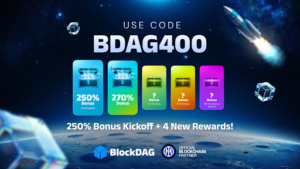
The second phase of the Drex pilot project of the CBDC of Brazil aims to modernize commercial finance with blockchain, involving Chainlink, Microsoft and Banco Inter to make transactions more secure, transparent, and efficient.
Let’s see all the details in this article.
The second phase of the CBDC project in Brazil focuses on collaborations with Microsoft and Chainlink
The Banco Central do Brasil (BCB) has recently announced the start of the second phase of the pilot project of its central bank digital currency (CBDC), named Drex.
This ambitious program aims to revolutionize cross-border transactions and innovate automation in trade finance using advanced technologies such as blockchain and decentralized oracles.
The current phase of the project has attracted the attention of key players, including Chainlink, Microsoft, Banco Inter, and 7Comm, who are collaborating to implement next-generation solutions in the sector.
The second phase of the Drex project focuses on creating a trade finance system that combines the security of blockchain with process automation.
An essential aspect of this phase is the tokenization of crucial documents such as electronic bills of lading (eBOL).
Which will allow the integration of mechanisms such as delivery versus payment (DvP) and the simultaneous settlement of payments in different currencies (PvP).
The main objective is to improve transparency and reduce inefficiencies in global trade, making operations safer and more traceable.
The Cross-Chain Interoperability Protocol (CCIP) of Chainlink plays a fundamental role, enabling communication between different blockchain platforms and facilitating cross-platform transactions.
This innovative system will ensure that asset transfers occur only after the payment has been confirmed. Thus reducing the risk of fraud and increasing trust between the parties involved.
At the same time, Microsoft will provide the cloud infrastructure necessary to manage the complex technical requirements of the project, while 7Comm will offer its expertise in blockchain integration.
Automation and innovation in commercial finance
The adoption of blockchain technology for supply chain management and cross-border transactions represents a significant step towards automation of trade finance in Brazil.
Thanks to tokenization and automated payment protocols, the Drex project will be able to improve compatibility between different platforms and currencies. Thus facilitating international operations for Brazilian businesses.
The Banco Central do Brasil hopes that these innovations will foster greater efficiency in operations and promote the adoption of more advanced financial solutions.
Another crucial element of this phase is the resolution of the “trilemma” of decentralization, which involves balancing privacy, programmability, and security.
The integration of decentralized solutions, such as liquidity pools for government securities, represents a technical challenge that the pilot team is addressing with great attention.
These solutions could open new opportunities for decentralized finance (DeFi) in the context of the CBDC, creating synergies between emerging technologies and financial regulation.
Banco Inter, one of the leading digital banks in Brazil, has taken on a leadership role in the implementation of the Drex platform.
The company sees the project as a strategic opportunity to expand market access and promote sustainable economic growth.
In a recent press release, Bruno Grossi, head of emerging technologies at Banco Inter, described the second phase of the project as a crucial moment for financial innovation in Brazil.
Collaborating with technological partners like Microsoft and Chainlink is considered a key element to achieve these ambitious goals.
The support of Microsoft is equally significant. The multinational will indeed provide the cloud resources to ensure that the project has the scalability and security necessary to operate on a large scale.
This collaboration highlights the importance of combining robust technological infrastructures with innovations in the commercial finance sector.
Furthermore, 7Comm will contribute with its expertise in blockchain system integration, ensuring that all technical components function efficiently.
Expansion of payment options
Beyond the progress related to the CBDC pilot project, private companies like Ripple are already looking to expand cross-border payment options in cryptocurrencies.
After forming a partnership with the Brazilian exchange Mercado Bitcoin, Ripple is introducing new solutions to facilitate international payments.
These initiatives further strengthen the ecosystem of digital currencies in Brazil, promoting an environment favorable to innovation.
The Drex pilot project will continue until 2025, further exploring the possibilities offered by tokenization and the automation of commercial finance.
The initiative could become a model for other countries looking to modernize their economic systems with the adoption of CBDCs and blockchain technologies.

 1 month ago
25
1 month ago
25









 English (US) ·
English (US) ·